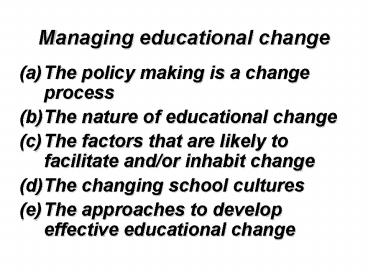Managing educational change - PowerPoint PPT Presentation
1 / 18
Title:
Managing educational change
Description:
Why do you think policy making is a change process? ... Openness willingness to hear, respond to and be influenced by one another. ... – PowerPoint PPT presentation
Number of Views:777
Avg rating:3.0/5.0
Title: Managing educational change
1
Managing educational change
- The policy making is a change process
- The nature of educational change
- The factors that are likely to facilitate and/or
inhabit change - The changing school cultures
- The approaches to develop effective educational
change
2
Self-reflection
- Why do you think policy making is a change
process? - List the forces that demand change at the school
level. - Why are teachers likely to resist change?
- What can be done to tackle these resistance?
3
The nature of planned change
- Change is a feature of all natural and human
systems. - Planned change concerns the processes whereby
phenomena are transformed and their
characteristics alter. - The aspects of a social system including inputs,
transformation process, outputs and includes
feedback loops for control. - Task Why do think schools are seen as social
systems.
4
Getting reforms right what works and what
doesnt! (Fullan Miles, 1992)
- Change is learning
- Change is journey, not a blueprint
- Problems are our friends
- Change is resource hungry
- Change requires power to mane it
- Change is systematic
- All large-scale change is implemented locally
5
Planned educational change is
- about dealing with perceptions and feelings
- about people more than things
- about changing school cultures
- likely to cause conflict
- dynamic
- about process more than product
6
Planned educational change involves
- The content of such a change (concepts, skills,
ideas and schools cultures) - The process by which planned change occurs
7
Forces for organizational change
- External forces and internal forces
- Accountability
- Changing demographics
- Staff shortages
- Technological changes and educational explosion
- Processes and people
- Task List some of the pressures for change at
your school level.
8
Resistance to change
- Uncertainty
- Concern over personal loss
- Group resistance
- Dependency
- Trust
- Awareness of weaknesses in the proposed change
9
Reducing resistance to change
- Education and communication
- Participation and involvement
- Facilitation and support
- Negotiation and agreement
- Support and cooperation
- Explicit and implicit coercion
10
Factors facilitating planned educational change
- Good management - sharing and caring
- Planning and support group
- The incentive system (positive reinforcement)
- Resource support
- Relevance and readiness
- Appropriate staff
11
Phases of planned change process
- Initiation
- Implementation
- Institutionalization/continuation/outcome
12
Stages of planned educational change process
- The unfreezing stage - Initiating and preparing
the stakeholders. - The changing stage - Implementing the plan.
- The re-freezing stage - institutionalizing the
successful plans
13
Unfreezing Stage
- Situation analysis (relevance, resources)
- readiness of the main change agents and users
- empowerment
14
The change stage
- Maintaining a flexible and supportive attitude
- Establishing different channels to increase
communication - Provide appropriate training
- Factors and themes
15
Re-freezing stage
- Institutionalizing the plan
- Further developing the successful efforts and
practices.
16
Change agents- why chosen?
- Integrity - trust
- Competence consulting, research, up-to-date,
training, etc. - TQM
17
Change agents - roles
- Hemophily alike and acceptance
- Empathy Understanding the feelings
- Linkage collaborative activities (togetherness)
- Proximity - closeness
- Structuring planning and organizing
- Capacity providing resources
- Openness willingness to hear, respond to and be
influenced by one another. - Reward rewarded for efforts
- Energy willing to work hard
- Synergy effect of the above on one another.
18
Educative role- change agents
- The perceptions and meanings of the clients are
very important. - Change is likely to be successful when the client
are in control of the change process. - Change agents should work themselves out of the
job. - Develop the confidence and skills of the clients
until they are self-reliant.































